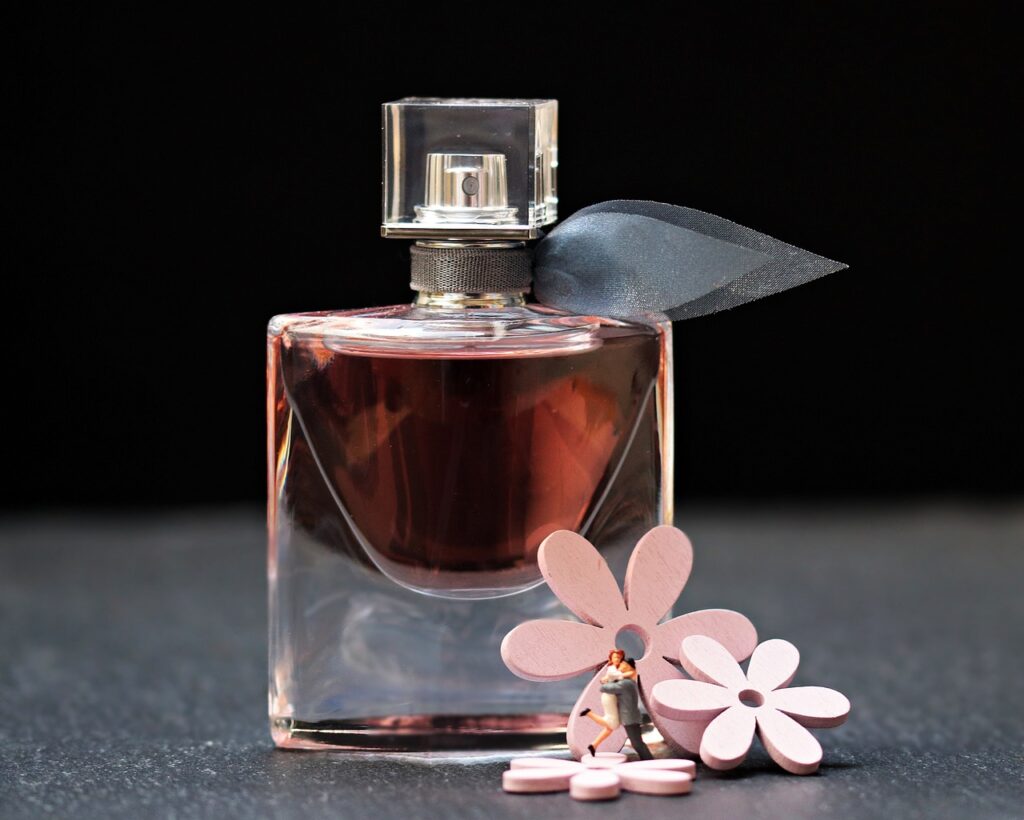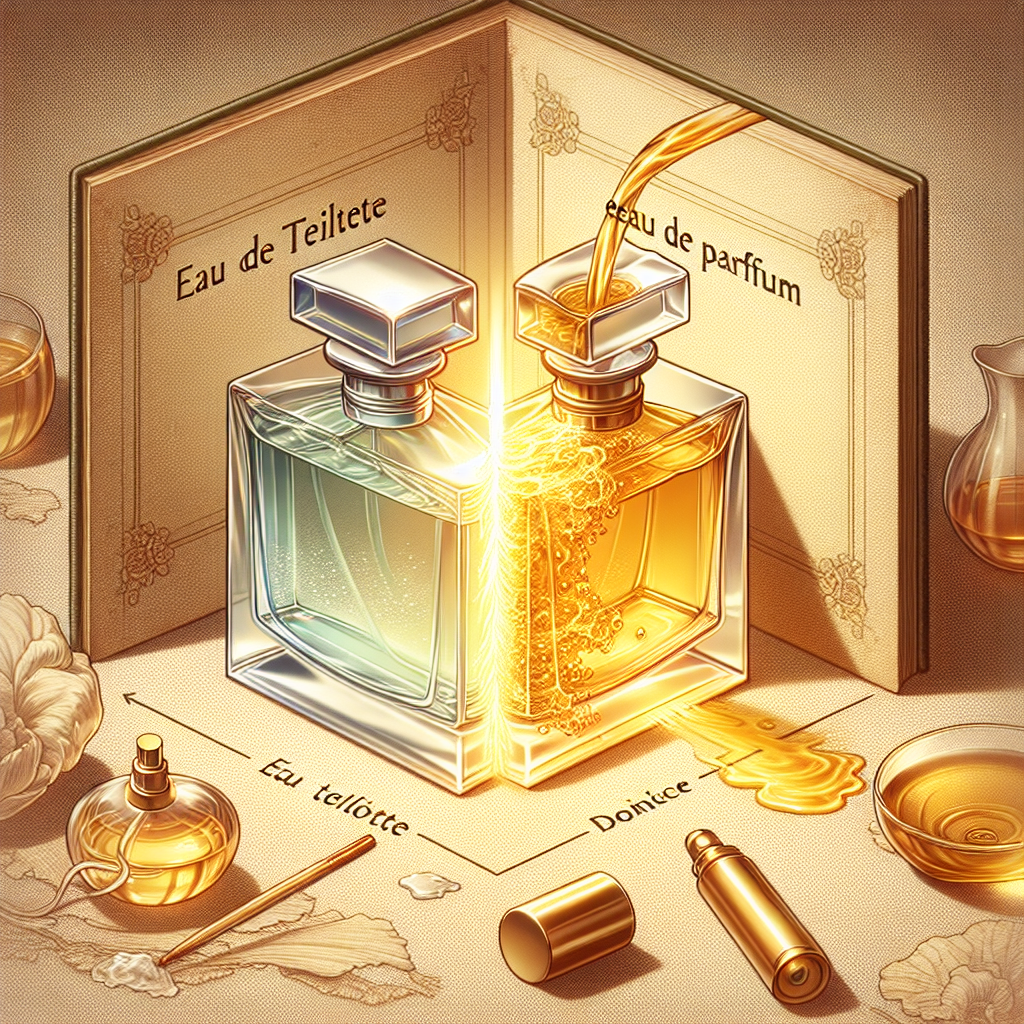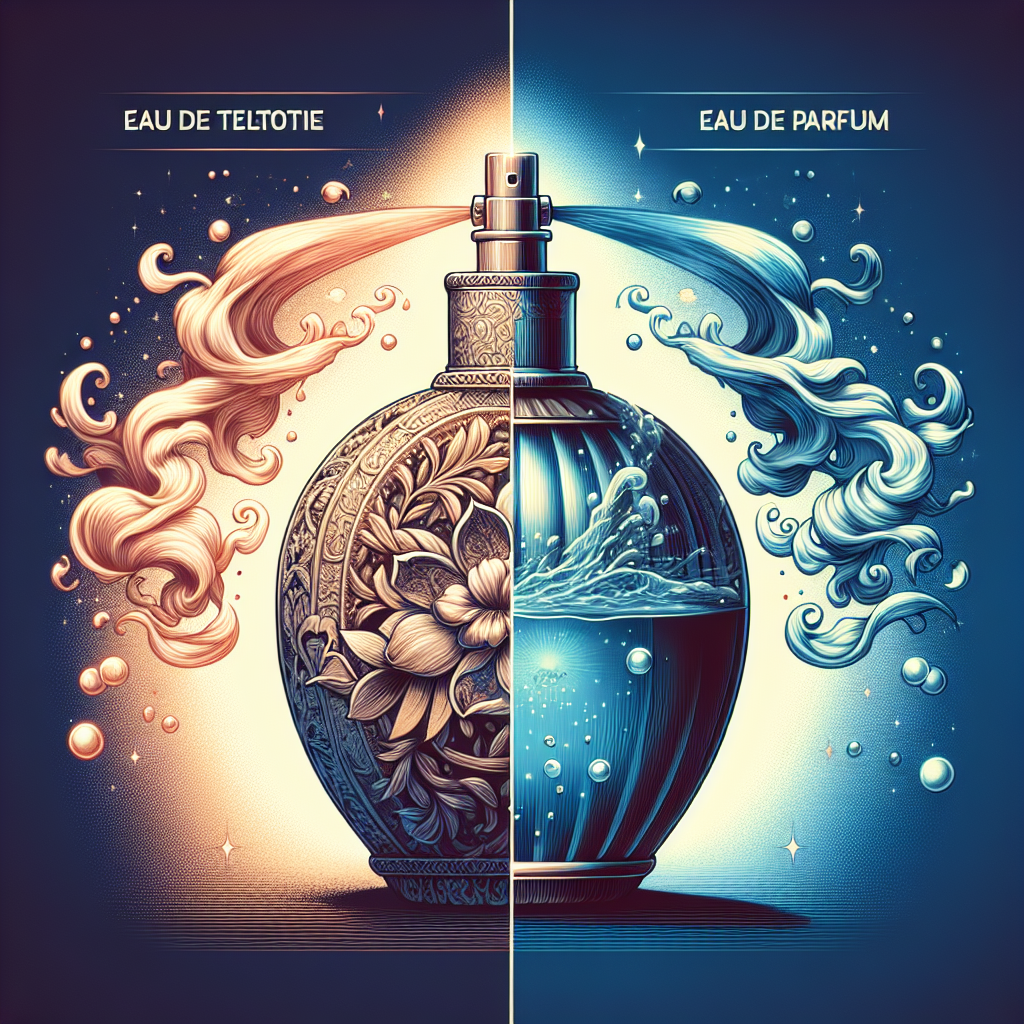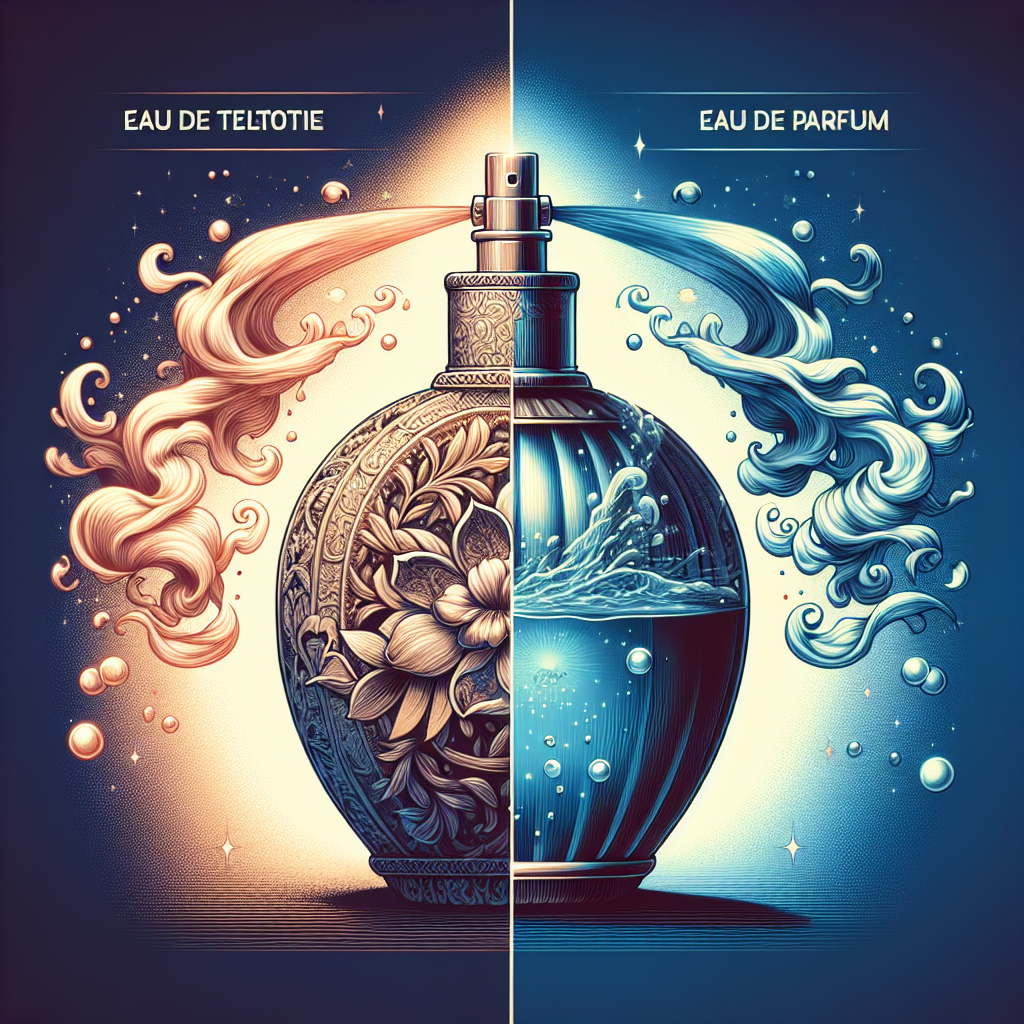Have you ever wondered what sets eau de toilette apart from eau de parfum? With so many different types of fragrance on the market, it’s easy to get confused. But fear not, because we’re here to help unravel this mystery for you. In a nutshell, the main difference lies in the concentration of perfume oil in each. Eau de toilette generally contains a lower concentration of oils, making it lighter and more suitable for everyday use, while eau de parfum boasts a higher concentration, resulting in a more intense and longer-lasting scent. So next time you’re browsing for a new fragrance, keep this in mind to ensure you choose the perfect scent that suits your needs.
Definition of Eau de Toilette
Overview
Eau de Toilette is a type of fragrance that falls within the spectrum of perfumes. It is lighter and less concentrated compared to Eau de Parfum, making it suitable for everyday use. Eau de Toilette is often characterized by its refreshing and invigorating qualities.
Composition
Eau de Toilette is composed of a mixture of alcohol, water, and fragrance oils. The fragrance oils used in Eau de Toilette are carefully selected to create a balanced and uplifting scent. These oils are typically diluted with alcohol and water to achieve the desired concentration.
Concentration of Fragrance Oils
The concentration of fragrance oils in Eau de Toilette is lower compared to Eau de Parfum. Typically, Eau de Toilette contains around 5-15% fragrance oils, which results in a lighter and more subtle scent. The lower concentration of fragrance oils also contributes to the overall affordability of Eau de Toilette compared to Eau de Parfum.
Scent Projection
Eau de Toilette has a moderate scent projection, meaning that it has a balanced level of projection without being overpowering. The scent of Eau de Toilette can be noticed within arm’s reach, making it suitable for everyday situations where a more subtle scent is desired.
Duration of Fragrance
The duration of fragrance in Eau de Toilette is generally shorter compared to Eau de Parfum. Depending on various factors, such as the specific fragrance and an individual’s body chemistry, Eau de Toilette typically lasts around 2-4 hours. It may require reapplication throughout the day to maintain its scent.
Definition of Eau de Parfum
Overview
Eau de Parfum is a type of fragrance that is more concentrated and long-lasting compared to Eau de Toilette. It is often associated with luxury and is ideal for special occasions or when you want a more intense scent experience.
Composition
Similar to Eau de Toilette, Eau de Parfum is composed of a mixture of alcohol, water, and fragrance oils. However, Eau de Parfum contains a higher concentration of fragrance oils, resulting in a more potent and long-lasting scent.
Concentration of Fragrance Oils
Eau de Parfum has a higher concentration of fragrance oils compared to Eau de Toilette. Typically, Eau de Parfum contains around 15-20% fragrance oils, making it more intense and long-lasting. The higher concentration of fragrance oils contributes to a richer and more complex scent profile.
Scent Projection
Eau de Parfum has a stronger and more noticeable scent projection compared to Eau de Toilette. The scent of Eau de Parfum can reach a wider radius, making it more suitable for evening events or situations where a bold and captivating fragrance is desired.
Duration of Fragrance
One of the key benefits of Eau de Parfum is its longer duration of fragrance. Due to its higher concentration of fragrance oils, Eau de Parfum can last anywhere from 4-8 hours or even longer. This longevity reduces the need for frequent reapplication, making it suitable for extended wear.

Differences in Composition
Ingredients
The ingredients used in both Eau de Toilette and Eau de Parfum are similar, including alcohol, water, and fragrance oils. However, the difference lies in the specific concentration of these ingredients. Eau de Toilette contains a lower concentration of fragrance oils compared to Eau de Parfum, resulting in a lighter and less intense fragrance.
Fragrance Notes
The selection and combination of fragrance notes can vary between Eau de Toilette and Eau de Parfum. Eau de Toilette often features fresh and citrusy notes, making it a popular choice for daytime wear. On the other hand, Eau de Parfum may include a wider range of notes, including floral, spicy, or woody, creating more depth and complexity in its scent profile.
Ratio of Alcohol to Water
Both Eau de Toilette and Eau de Parfum contain alcohol and water to aid in the distribution and stabilization of the fragrance oils. However, the ratio of alcohol to water may differ between the two. Eau de Toilette usually has a higher percentage of alcohol compared to Eau de Parfum, which contributes to its lighter and more refreshing nature.
Differences in Concentration of Fragrance Oils
Percentage of Fragrance Oils
The concentration of fragrance oils is a significant factor that distinguishes Eau de Toilette from Eau de Parfum. Eau de Toilette typically contains 5-15% fragrance oils, while Eau de Parfum has a higher concentration of 15-20%. This disparity leads to differences in the intensity and longevity of the scent.
Raw Material Cost
The higher concentration of fragrance oils in Eau de Parfum often translates to a higher raw material cost. The additional percentage of fragrance oils used in Eau de Parfum contributes to the complexity and richness of the scent, making it a more luxurious option. Consequently, Eau de Parfum is usually priced higher than Eau de Toilette.
Intensity of Scent
The higher concentration of fragrance oils in Eau de Parfum results in a more intense and noticeable scent compared to Eau de Toilette. Eau de Parfum has a stronger and longer-lasting presence, which can be advantageous for special occasions or when you want to make a lasting impression. However, some individuals may find the intensity of Eau de Parfum overwhelming for everyday use.

Differences in Scent Projection
Distance of Scent
The scent projection of a fragrance refers to how far the scent travels or can be detected by others. Eau de Toilette generally has a moderate projection, meaning that the scent remains within arm’s reach. On the other hand, Eau de Parfum has a stronger projection, allowing the scent to reach a wider radius.
Strength of Scent
Eau de Toilette and Eau de Parfum differ in the strength of their scent. Eau de Toilette typically has a lighter and more subtle scent, suitable for those who prefer a more understated fragrance. Eau de Parfum, with its higher concentration of fragrance oils, possesses a stronger and more impactful scent profile, making it a preferred choice for individuals who desire a bolder and more captivating fragrance.
Silage
Silage refers to the trail or lingering effect of a fragrance as you pass by. Eau de Parfum often leaves a more noticeable silage compared to Eau de Toilette. The stronger and more concentrated scent of Eau de Parfum allows it to leave a lasting impression even after you have left the room, making it a popular choice for those who want to be remembered.
Differences in Duration of Fragrance
Longevity
The duration of fragrance refers to how long a scent remains noticeable on the skin after application. Eau de Toilette generally has a shorter longevity compared to Eau de Parfum. Eau de Toilette typically lasts around 2-4 hours, while Eau de Parfum can last 4-8 hours or even longer. The higher concentration of fragrance oils in Eau de Parfum contributes to its extended duration.
Number of Applications
The need for reapplication differs between Eau de Toilette and Eau de Parfum due to their varying longevity. Eau de Toilette may require more frequent reapplication throughout the day to maintain its scent, especially if you desire a continuous presence of fragrance. On the other hand, Eau de Parfum generally requires fewer applications due to its longer duration.
Reapplication Frequency
When considering the frequency of reapplication, Eau de Toilette often requires more frequent touch-ups compared to Eau de Parfum. Reapplying Eau de Toilette every few hours can help maintain its scent throughout the day. In contrast, Eau de Parfum can be applied less frequently due to its longer-lasting properties. However, personal preferences and desired scent strength may impact the reapplication frequency.

Choosing Between Eau de Toilette and Eau de Parfum
Personal Preference
Choosing between Eau de Toilette and Eau de Parfum ultimately depends on personal preference. If you prefer a lighter and more subtle fragrance that can be worn on a daily basis, Eau de Toilette may be the better choice for you. However, if you desire a more intense, long-lasting scent that makes a statement, Eau de Parfum may be more suitable.
Occasion and Context
Consider the occasion and context in which you plan to wear the fragrance. Eau de Toilette is well-suited for daytime use, casual events, or professional settings where a more understated scent is preferred. Eau de Parfum, with its stronger projection and intensity, is better suited for special occasions, evening events, or whenever you want to make a bold impression.
Climate and Temperature
The climate and temperature in which the fragrance will be worn can impact your choice between Eau de Toilette and Eau de Parfum. In warmer climates or during hot summer months, Eau de Toilette’s lighter and refreshing nature can provide a more comfortable scent experience. In cooler seasons or colder climates, Eau de Parfum’s richer and more intense fragrance may be better suited to withstand the lower temperatures.
Budget Considerations
Consider your budget when deciding between Eau de Toilette and Eau de Parfum. Eau de Toilette is generally priced lower than Eau de Parfum due to its lower concentration of fragrance oils. If cost is a significant consideration, Eau de Toilette provides an affordable option without compromising on the overall fragrance experience.
Use and Application Tips
How to Apply Eau de Toilette
When applying Eau de Toilette, it is essential to remember that less is more. Start by spraying a small amount onto your wrist, neck, or other pulse points. Allow the fragrance to settle and interact with your body’s natural chemistry before evaluating its scent. If desired, lightly layer the fragrance by spraying it onto clothing or hair, taking care not to overapply.
How to Apply Eau de Parfum
To apply Eau de Parfum, follow a similar process to Eau de Toilette. Begin by spraying a small amount onto your skin or pulse points and allow the fragrance to develop. Due to its higher concentration, Eau de Parfum may require even less application than Eau de Toilette. Apply sparingly and avoid overapplication to prevent an overwhelming scent.
Layering Fragrances
To create a unique and personalized scent, consider layering fragrances. Start by selecting complementary notes and apply a base fragrance, such as a body lotion or oil, to moisturize the skin and enhance the longevity of the scent. Follow with the application of Eau de Toilette or Eau de Parfum to layer and build upon the base fragrance, creating a multi-dimensional fragrance experience.
Reactions to Fragrance Types
Individual reactions to fragrance types can vary due to personal preferences and sensitivities. It is essential to test fragrances before purchasing or applying them extensively. Try a sample or apply a small amount to your skin to test for any adverse reactions, such as allergies or sensitivity to specific notes. Choose fragrances that you enjoy and that complement your body chemistry.

Famous Perfumes in Eau de Toilette and Eau de Parfum
Iconic Eau de Toilette Perfumes
- Chanel No. 5 EDT: A timeless and iconic fragrance that embodies elegance and sophistication.
- Dior Sauvage EDT: A masculine fragrance with fresh and woody notes, capturing a sense of freedom and the spirit of the wild.
- Acqua di Gio EDT: A classic and refreshing fragrance with marine and citrusy notes, reminiscent of a seaside escape.
Iconic Eau de Parfum Perfumes
- Chanel Coco Mademoiselle EDP: A luxurious and feminine fragrance with floral and oriental notes, exuding elegance and sensuality.
- Tom Ford Black Orchid EDP: A seductive and mysterious fragrance with rich and dark notes, embracing a sense of opulence and allure.
- Viktor & Rolf Flowerbomb EDP: A captivating and floral fragrance that evokes a sense of romance and femininity.
Conclusion
In summary, the difference between Eau de Toilette and Eau de Parfum lies in their concentration of fragrance oils, resulting in variations in scent projection, duration, and overall intensity. Eau de Toilette is a lighter and more affordable option suitable for everyday use, while Eau de Parfum offers a more intense and long-lasting scent experience ideal for special occasions. Personal preferences, occasion, climate, and budget considerations should guide your choice between the two. Regardless of the option chosen, both Eau de Toilette and Eau de Parfum allow you to express your individuality and enhance your overall fragrance journey.






